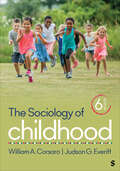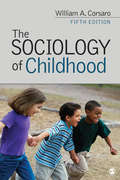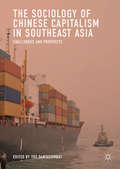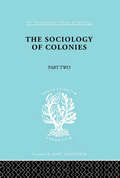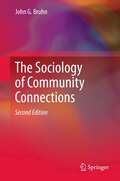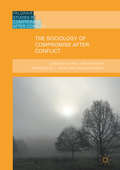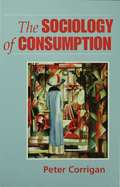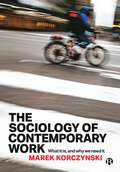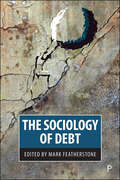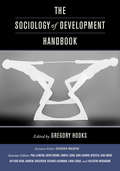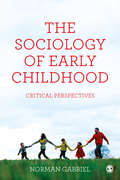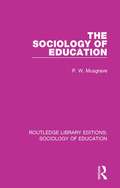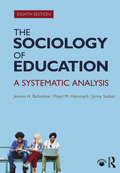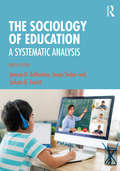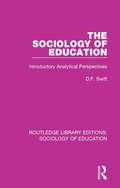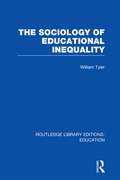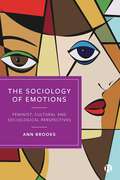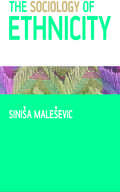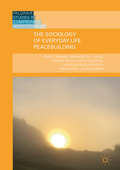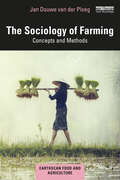- Table View
- List View
The Sociology of Childhood (Sociology for a New Century Series)
by William A. Corsaro Judson G. EverittThe Sixth Edition of William A. Corsaro and Judson G. Everitt′s groundbreaking text discusses children and childhood from a sociological perspective—providing in-depth coverage of social theories of childhood, the peer cultures and social issues of children and youth, and children and childhood within the frameworks of culture and history. This revised edition has been thoroughly updated to incorporate the latest research and the most pertinent information so readers can engage in powerful discussions on a wide array of topics.
The Sociology of Childhood (Sociology for a New Century Series)
by William A. Corsaro Judson G. EverittThe Sixth Edition of William A. Corsaro and Judson G. Everitt′s groundbreaking text discusses children and childhood from a sociological perspective—providing in-depth coverage of social theories of childhood, the peer cultures and social issues of children and youth, and children and childhood within the frameworks of culture and history. This revised edition has been thoroughly updated to incorporate the latest research and the most pertinent information so readers can engage in powerful discussions on a wide array of topics.
The Sociology of Childhood (Sociology for a New Century Series)
by William CorsaroWilliam A. Corsaro’s groundbreaking text, The Sociology of Childhood, discusses children and childhood from a sociological perspective. Corsaro provides in-depth coverage of the social theories of childhood, the peer cultures and social issues of children and youth, children and childhood within the frameworks of culture and history, and social problems and the future of childhood. The Fifth Edition has been thoroughly updated to incorporate the latest research and the most pertinent information so readers can engage in powerful discussions on a wide array of topics.
The Sociology of Childhood (Sociology for a New Century Series)
by William CorsaroWilliam A. Corsaro’s groundbreaking text, The Sociology of Childhood, discusses children and childhood from a sociological perspective. Corsaro provides in-depth coverage of the social theories of childhood, the peer cultures and social issues of children and youth, children and childhood within the frameworks of culture and history, and social problems and the future of childhood. The Fifth Edition has been thoroughly updated to incorporate the latest research and the most pertinent information so readers can engage in powerful discussions on a wide array of topics.
The Sociology of Chinese Capitalism in Southeast Asia: Challenges and Prospects
by Yos SantasombatSet within the context of ASEAN integration, this book considers how Capitalism from China interacts with the ASEAN Economic Community, considering the issue from a variety of sociological, cultural and economic perspectives. It examines some of the creative strategies – de-sinicization, re-sinicization and re-balancing – employed by local Chinese communities and ASEAN countries to cope with the pressures of Chinese capitalism. The book addresses the phenomenon of Chinese ethnic economic migration, particularly the social capital of being Chinese in South East Asia, as well as community building, the interplay between domestic politics and globalization, and the rise of Chinese tourism related entrepreneurship.
The Sociology of Colonies [Part 2]: An Introduction to the Study of Race Contact (International Library of Sociology)
by Rene MaunierFirst published in 1998. Routledge is an imprint of Taylor & Francis, an informa company.
The Sociology of Community Connections
by John G. BruhnMany of our current social problems have been attributed to the breakdown or loss of community as a place and to the fragmentation of connections due to an extreme value of individualism in the Western world, particularly in the United States. Not all scholars and researchers agree that individualism and technology are the primary culprits in the loss of community as it existed in the middle decade of the 20th century. Nonetheless, people exist in groups, and connections are vital to their existence and in the daily performance of activities. The second edition of the Sociology of Community Connections will identify and help students understand community connectedness in the present and future.
The Sociology of Compromise after Conflict (Palgrave Studies in Compromise after Conflict)
by John D. BrewerThis book introduces a new and original sociological conceptualization of compromise after conflict and is based on six-years of study amongst victims of conflict in Northern Ireland, South Africa and Sri Lanka, with case studies from Sierra Leone and Colombia. A sociological approach to compromise is contrasted with approaches in Moral and Political Philosophy and is evaluated for its theoretical utility and empirical robustness with in-depth interview data from victims of conflicts around the globe. The individual chapters are written to illustrate, evaluate and test the conceptualization using the victim data, and an afterword reflects on the new empirical agenda in victim research opened up by a sociological approach to compromise. This volume is part of a larger series of works from a programme advancing a sociological approach to peace processes with a view to seeing how orthodox approaches within International Relations and Political Science are illuminated by the application of the sociological imagination.
The Sociology of Consumption: An Introduction
by Dr Peter CorriganThis lucid introduction to the sociology of consumerism examines the relationship between production and consumption in late capitalist societies. The historical and theoretical discussion provides the student with the tools to examine key themes in the sociology of consumption. After a detailed historical overview of the advent of consumer society, Peter Corrigan examines theoretical accounts of consumption and consumer practice, including: Veblen and conspicuous consumption; Mary Douglas on the world of goods; Jean Baudrillard on the system of objects; and Pierre Bourdieu on cultural capital. This historical and theoretical discussion provides the student with the tools to examine key themes in the sociology of consumption.
The Sociology of Contemporary Work: What It Is, and Why We Need It
by Marek KorczynskiThis book injects a burst of energy into the sociology of work, offering a perspective that is both innovative and deeply informed. Leading sociology of work scholar, Marek Korczynski, praises the discipline’s comprehensive approach to theory, its focus on uncovering power dynamics and its ability to reveal how social injustices often stem from workplace inequalities. Offering an accessible overview of the field, the book: · analyses both the social structures around work and the voice and agency of workers; · examines the role and impact of artificial intelligence at work; · provides a consistent thread on gig work, service work and knowledge work; · has an end-section in each chapter where students are asked to put their sociological imagination to work on relevant topics. This is an enlightening exploration of sociology of work, and of the evolving world of work itself.
The Sociology of Debt
by Mark FeatherstoneOver the course of the last ten years the issue of debt has become a serious problem that threatens to destroy the global socio-economic system and ruin the everyday lives of millions of people. This collection brings together a range of perspectives of key thinkers on debt to provide a sociological analysis focused upon the social, political, economic, and cultural meanings of indebtedness. The contributors to the book consider both the lived experience of debt and the more abstract processes of financialisation taking place globally. Showing how debt functions on the level of both macro- and microeconomics, the book also provides a more holistic perspective, with accounts that span sociological, cultural, and economic forms of analysis.
The Sociology of Development Handbook
by Gregory HooksThe Sociology of Development Handbook gathers essays that reflect the range of debates in development sociology and in the interdisciplinary study and practice of development. The essays address the pressing intellectual challenges of today, including internal and international migration, transformation of political regimes, globalization, changes in household and family formations, gender dynamics, technological change, population and economic growth, environmental sustainability, peace and war, and the production and reproduction of social and economic inequality.
The Sociology of Disruption, Disaster and Social Change
by Hendrik VollmerIn the wake of disruption and disaster, cooperation among members of a collective is refocused on matters of status, membership and the formation of coalitions. In an important contribution to sociological theory, Hendrik Vollmer emphasizes the processes through which disruptions not only affect, but also transform social order. Drawing on Erving Goffman's understanding of framing and the interaction order, as well as from a range of insights from contemporary sociological theory and ethnographic, historical and organizational research, Vollmer addresses the dynamics of disaster and disaster response within the framework of a general theory of disruption and social order. It is proposed that the adjustment of cooperation in favour of coalition-forming strategies is robust in both informal and organized social settings and transcends the 'micro' and 'macro' approaches currently favoured by theorists. Offering a systematic sociological analysis of the impact of disruptiveness, this book investigates how punctuated cooperation precipitates social change.
The Sociology of Early Childhood: Critical Perspectives
by Norman GabrielThe Sociology of Early Childhood is a theoretically and historically grounded examination of young children’s experiences in contemporary society. Arguing that a sociology of early childhood must bring together and integrate different disciplines, this book: synthesises different sociological perspectives on childhood as well as incorporating multi-disciplinary research findings on the lives of young children explains key theoretical concepts in early childhood studies such as investment, early intervention, professional power and discourse examines the importance of play, memory and place evaluates long term parenting trends uses illustrative examples and case studies, discussion questions and annotated further reading to engage and stimulate readers. Invigorating and thought provoking, this is an invaluable read for advanced undergraduates and postgraduate students looking for a more nuanced and progressive understanding of childhood.
The Sociology of Early Childhood: Critical Perspectives
by Norman GabrielThe Sociology of Early Childhood is a theoretically and historically grounded examination of young children’s experiences in contemporary society. Arguing that a sociology of early childhood must bring together and integrate different disciplines, this book: synthesises different sociological perspectives on childhood as well as incorporating multi-disciplinary research findings on the lives of young children explains key theoretical concepts in early childhood studies such as investment, early intervention, professional power and discourse examines the importance of play, memory and place evaluates long term parenting trends uses illustrative examples and case studies, discussion questions and annotated further reading to engage and stimulate readers. Invigorating and thought provoking, this is an invaluable read for advanced undergraduates and postgraduate students looking for a more nuanced and progressive understanding of childhood.
The Sociology of Education (Routledge Library Editions: Sociology of Education #40)
by P W MusgraveFirst published in 1979, this third edition of The Sociology of Education at the time held the field as the standard textbook on the subject. It takes into account the changes that occurred in the field from the publication of the first edition in 1965 and the second edition in 1972. The book is divided into three parts: the first considers the way in which the child becomes a social being and the influences upon them of the family, the peer group and the mass media; the second deals with the sociology of schooling and looks at different types and stages of schools, as well as the attitudes and forms of interaction within them; and finally the third traces the relationship between education and social institutions, and looks at the balance between the preservation of social stability and the introduction of change.
The Sociology of Education: A Systematic Analysis
by Floyd M Hammack Jeanne BallantineA comprehensive and cross-cultural look at the sociology of education. The text integrates important and diverse topics in the field by showing how they are related. The Sociology of Education: A Systematic Analysis provides a sociological analysis of education using several theoretical approaches. The authors include practical applications and current educational issues to discuss the structure and processes that make education systems work. Learning Goals Upon completing this book, readers should be able to: Learn diverse theoretical approaches in the sociology of education Assess important current or emerging topics, including higher education, informal education ("climate" and the "hidden curriculum"), the school environment, education around the world, and educational movements and alternatives Understand how change takes place and what role sociologists play Become involved with educational systems where they can put to use the knowledge available in textbooks
The Sociology of Education: A Systematic Analysis
by Jeanne H. Ballantine Floyd M. Hammack Jenny StuberThe Sociology of Education: A Systematic Analysis is a comprehensive and cross-cultural look at the sociology of education. This textbook gives a sociological analysis of education by incorporating a diverse set of theoretical approaches. The authors include practical applications and current educational issues to discuss the structure and processes that make education systems work as well as the role sociologists play in both understanding and bring about change. In addition to up-to-date examples and research, the eighth edition presents three chapters on inequality in educational access and experiences, where class, race and ethnicity, and gender are presented as separate (though intersecting) vectors of educational inequality. Each chapter combines qualitative and quantitative approaches and relevant theory; classics and emerging research; and micro- and macro-level perspectives.??
The Sociology of Education: A Systematic Analysis
by Jenny Stuber Judson G. Everitt Jeanne H BallantineThe ninth edition of The Sociology of Education examines the field in rare breadth by incorporating a diverse range of theoretical approaches and a distinct sociological lens in its overview of education and schooling. Education is changing rapidly, just as the social forces outside of schools are, and to present the material in a meaningful way, the authors of this book provide a unifying framework—an open systems approach—to illustrate how the issues and structures we find in education are all interconnected. Separate chapters are devoted to how schools help shape who has access to educational opportunities and who does not; issues of race, class and gender; the organization of schools and the roles that make up educational settings, and more. Throughout the book, readers will have an opportunity to engage with theories and issues that are discussed and to apply their newly obtained understanding in response to emerging and persistent problems in the educational system. The new edition continues to be a critical point of reference for students interested in exploring the social context of education and the role education has in shaping our society. It is perfect for sociology of education and social foundations of education courses at the undergraduate or early graduate level.
The Sociology of Education: Introductory Analytical Perspectives (Routledge Library Editions: Sociology of Education #54)
by Donald Francis SwiftFirst published in 1969, this book examines the educational process as a whole in relation to its society. The discussion is set within a specifically sociological frame of reference and looks at the school as an organisation as well as the social environment surrounding the school. It concludes by considering some of the basic issues concerning the functions of education for society. Written at a time when sociological studies of education were scarce, this ground-breaking work will be of interest to those studying education and its relationship with society.
The Sociology of Educational Inequality (Routledge Library Editions: Education)
by William TylerWhat is the most significant factor for explaining why some individuals are more successful than others – genetic inheritance, privileged background or luck? Although conventional approaches stress the prime importance of one of these, Tyler argues that such theories fail to deal adequately with the complexity of educational inequality and suggests that Boudon’s model of opportunity and mobility would provide us with a more productive explanation. By applying this model to post-war British education he shows how we might effectively think our approaches to the ‘cycle of deprivation’, comprehensive reform and educational spending.
The Sociology of Emotions: Feminist, Cultural and Sociological Perspectives
by Ann BrooksThis book offers a comprehensive overview of the field of the Sociology of Emotions, incorporating sociological, feminist and cultural perspectives. Structured around three dimensions - conceptualisation, theory and analysis of emotions - it provides new insights into the field, with a particular focus on contemporary social issues such as loneliness, depression, confidence, consumption, class, intimacy and sexuality. The book examines the language of emotions, looking at macro and micro framing of emotions in modernity, emotional labour, public emotions, passionate emotions, melancholic emotions, masculinity and emotions, love, intimacy and emotions. It delves into both positive and negative emotions such as happiness, anger, fear and sadness. The book will be essential reading for researchers and students seeking a current and interdisciplinary resource covering a wide range of international material in the field of Sociology of Emotions.
The Sociology of Ethnicity
by Sinisa Malesevic"This book offers an original synthesis of existing knowledge, pointing forward in a manner that could influence a new generation's conception of the field and its agenda. If it attracts the attention it merits, it could prove one of the most important books about ethnic and racial relations since the nineteen-eighties." - Michael Banton, Ethnic and Racial Studies "Malesevic provides a thorough and balanced account of the sociological foundations of the study of ethnicity... His presentation is as critical and engaging as it is easy to read and logically organized. It is invaluable reading for sociologists." - Jon Fox, British Journal of Sociology Spanning classical sociology to current debates, The Sociology of Ethnicity synthesizes the leading sociological interpretations of ethnic relations and provides a coherent theoretical framework for its analysis. In this thoughtful and accessible text, Sinisa Malesevic assesses the explanatory strength of a range of sociological theories in understanding ethnicity and ethnic conflict. While acknowledging that there is no master key or blue-print to deal with each and every case of interethnic group relations, The Sociology of Ethnicity develops the best strategy to bridge epistemological and policy requirements for interethnic group relations. The Sociology of Ethnicity will be required reading for advanced undergraduates and postgraduates studying ethnicity and race in sociology and across the social sciences.
The Sociology of Everyday Life Peacebuilding (Palgrave Studies in Compromise after Conflict)
by John D. Brewer Bernadette C. Hayes Francis Teeney Katrin Dudgeon Natascha Mueller-Hirth Shirley Lal WijesingheThis book uses in-depth interview data with victims of conflict in Northern Ireland, South Africa and Sri Lanka to offer a new, sociological conceptualization of everyday life peacebuilding. It argues that sociological ideas about the nature of everyday life complement and supplement the concept of everyday life peacebuilding recently theorized within International Relations Studies (IRS). It claims that IRS misunderstands the nature of everyday life by seeing it only as a particular space where mundane, routine and ordinary peacebuilding activities are accomplished. Sociology sees everyday life also as a mode of reasoning. By exploring victims’ ways of thinking and understanding, this book argues that we can better locate their accomplishment of peacebuilding as an ordinary activity. The book is based on six years of empirical research in three different conflict zones and reports on a wealth of interview data to support its theoretical arguments. This data serves to give voice to victims who are otherwise neglected and marginalized in peace processes.
The Sociology of Farming: Concepts and Methods (Earthscan Food and Agriculture)
by Jan Douwe van der PloegThis book provides a detailed and comprehensive introduction to the concepts and methods of the sociology of farming. The sociology of farming focuses on co-production: the ongoing interaction and mutual transformation of the natural and the social (of ‘human and living nature’) which requires putting the farm labour process centre stage. While there are many books which discuss food and agriculture, this book is different: it delves into the methods and concepts used and presents a comprehensive conceptual framework and the associated methods for research to give students and researchers of agriculture and rural studies a solid set of tools for unravelling the complexities of farming and rural life. Importantly, these tools also empower us to design new ways forward. A wide array of case studies, as wide-ranging as Brazil, Peru, China, the Netherlands, Italy and Guinea Bissau, help readers to grasp the commonalities that underlie strongly diversified and divided rural worlds. The book lists over two hundred basic concepts and includes boxes that discuss the main methods of the sociology of farming. This textbook is essential reading for students and scholars of food and agriculture, agrarian studies, rural development, food and farming systems, peasant studies and environmental sociology.
